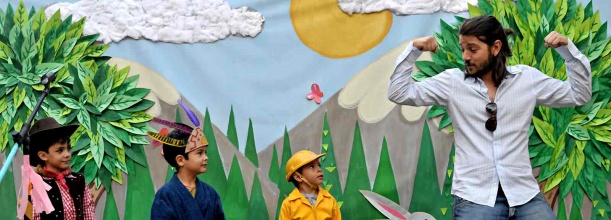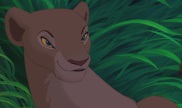Interview with Abel director Diego Luna

Abel opens in the UK this week, marking the first fiction film directed by well-known Mexican actor Diego Luna. After starring in such acclaimed films as Y Tu Mama Tambien and Milk, the actor has recently moved behind the camera into directing (his first film was a documentary about the great boxer J.C Chavez.) and producing. Abel is a very different project, telling the story of an unusual young boy with bizarre interpretations of the world around him. Diego was kind enough to talk to us about his critically acclaimed feature, and spoke passionately about his clear love for cinema. Greeting Diego, we congratulated him on his wonderful film, and sat down to listen to his insight into the making of Abel, his cast and the future projects of his production company, Canana.

BFF: Hello there Mr Luna! First off, seeing as you’ve worked closely with some great filmmakers over the years, we were intrigued to find out who were your biggest influences as a director?
Alfonso Cuaron is a very important person in my life for many reasons, he got me involved with cinema, he presented cinema to me in many ways. The list (of influences) is really long, In terms of influences for Abel, a film we used as a reference, we talked a lot and many times I was thinking of Barton Fink, the Coen Brothers film. (Their films) have this reality that is twisted, there is something weird about it but you end up jumping into the reality and believing it as an audience. There’s not a distance, it’s not a fantasy world… I wanted to do that, it can only go so far but I wanted you to believe it, it was a very fine line. Also Wes Anderson is a reference for this film.
After appearing in so many films as an actor, did you find moving into directing to be an easy transition? Do you prefer to be in front of or behind the camera?
(At the moment) I prefer to be behind, partly because I’ve been in front for so long, but I wouldn’t want to have to choose! There’s nothing like directing, but that doesn’t mean I’m not going to join other directors and help them tell their stories. I also believe that as a director it’s nice to have some time off, you know, to join someone else’s story for a little while. You cannot live inside your own head for such a long time, because it’s so intense! It’s nice to go and join someone else, either acting or producing, to get some rest from your own ideas and stories, and also to grow and learn from someone.
One aspect of Abel that has got critics talking is the impressive performance from young Christopher Ruiz Esparza, do you think we will be seeing more of him in the future?
Yes Definitely, the whole film is about a kid, and a mother. I knew the mother and I knew that she would deliver a fantastic performance, but the film means nothing if there’s no kid there. You have to get involved with this kid and you have to believe – earlier when I spoke about twisted realities, it’s through his eyes that you can believe this is possible.
It was quite amazing to work with Christopher, because I designed everything around him. The whole process was designed for him, the idea was to build a playground and let him come and play, and never forget that he was a kid. He never read a script, we gave him a character but he didn’t know what the story was about, so every day he was finding out what the story was going to say that day. Many times he didn’t know exactly what we were doing, he just knew exactly what he needed to know. Everyone would say to me “Why are you working with kids? It’s so difficult to work with kids!” Everyone always says “No kids, no animals blah blah blah” and I believe that we haven’t found a way to work with kids because we haven’t been intelligent enough to realise that it’s us who have to change while there’s a kid there.
So everyone had to reinvent the way they would approach the work, actors had never had a chance to rehearse with this actor so everyone had to know what we needed from them, because there wasn’t a second chance. So it would be 6AM and we would be rehearsing with the grown-ups, telling everyone what to do and then would tell them to disappear, (with) every script from the set, and then the kid would come in. When the kid came in there was this silence, the whole atmosphere changed – everyone had to be so alert, you couldn’t talk about the story. No-one could say to the kid “So how’s your swimming for the ending?”. Everyone had to be ready for the moment, and that brought a fantastic feeling around the set.

The film builds from some excellent comedy sequences to an immensely powerful and tense ending. How did the young cast cope with the range of emotions that needed to be portrayed? Was it that day-by-day shooting that created that momentum?
Yes, by the end of the film the kids were so (professional) you couldn’t fool them, (they) knew exactly what was needed from them, how to achieve it, and how to use the team. Whenever people say about the great performances they deliver, I say it’s because of the adults, because these professionals were humble enough, and were generous enough to be there helping them every moment. Many times the adults helped me to trigger things from the kids that I needed. It’s not necessarily your job as an actor – your job is to be as real as possible and to bring a character to life – here many times I needed them to help me, I needed Karina (Gidi, who plays Cecilia) to start crying in a moment when no-one was expecting this, and the reaction of the kids would be different. Things like that were done throughout the process – when the water breaks, he (Christopher) didn’t know it would, I just said “Go to take a shower” and we broke it – so the reaction is real, he though he broke something! That fresh reaction was the one i used as it was unique.
The creative partnership between you and Gael Garcia Bernal has many fans, do you have many plans to work together again in the future? And how was the experience of shooting new Will Ferrell film Casa Di Mi Padre?
We just did (Casa di mi padre), a comedy, a crazy comedy that we enjoyed a lot! we shot that film and it was a laugh that lasted for 6 weeks – it was healing in many ways. We have a production company together (Canana) and we produce a lot, and will definitely be acting together again someday.
So what do Canana have lined up for release?
Right now we are shooting Gerardo Naranjo’s film, he is a fantastic Mexican director. I am writing a script for a film I intend to direct next year with the same writer I wrote Abel with
So having directed both documentary and fiction film, what are your plans for his next feature? What direction do you see yourself heading in?
I’m going to explore everything I couldn’t in Abel – It’s going to be a reaction to Abel in many ways because Abel was so fresh. We are looking for humour because laughing is important. What we’re going through in Mexico is not funny at all so I want to do a film that makes people laugh.
Diego Luna is without doubt a director to watch, having cultivated a fantastic instinct for film from spending years acting in some superb features. Speaking to him it became clear just how much cinema means to him, and his understanding of all aspects of cinema is hugely engaging. the continuing contribution of this talented young director to the cinema of Mexico is sure to be just as fine as Abel. Check out our review here






Recent Comments